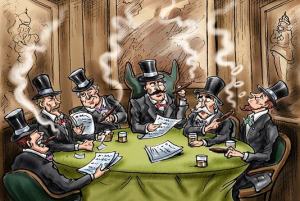One of the readers of Hungarian Spectrum suggested that we should discuss István Hegedűs’s article in Élet és Irodalom which also deals with the Bálint Magyar thesis of the post-communist mafia state. First a few words about István Hegedűs. As opposed to Bálint Magyar and Gábor Horn, Hegedűs was one of the leading members of Fidesz prior to 1993, when he and others became disillusioned with the direction in which Viktor Orbán and László Kövér were leading the party. Some of the more important “dissidents” besides Hegedűs were Gábor Fodor, Klára Ungár, Péter Molnár, and Zsuzsanna Szelényi. At that time only Gábor Fodor continued a political career (in SZDSZ) while the others abandoned politics altogether. In the last few weeks, however, Zsuzsanna Szelényi has reappeared in Együtt 2014-PM as a spokesperson on matters of education. Hegedűs is a sociologist with a long list of publications, some of which are available in English. He is especially interested in the media, political parties, and the European Union. He teaches at École Supérieure des Sciences Commerciales d’Angers (ESSCA)’s English-language division in Budapest. In 2001 these five dissidents wrote a fairly lengthy book about the early years of Fidesz. I started rereading it this afternoon and came to the conclusion that it is perhaps even more valuable today than it was twelve years ago. After all, since then we have found out a great deal about the Fidesz leadership and the mechanics of the party’s inner workings. So, what does Hegedűs think of Bálint Magyar’s thesis? As opposed to Gábor Horn, he considers Magyar’s “conception a systematically elucidated, comprehensive and convincing construction.” However, Hegedűs points out that there are many other observable characteristics that cannot be explained solely by the mafia-state mentality. The mafia-state might be a perfect description in the economic sphere but not necessarily in the political realm. Age-old concepts like one-man leadership, a system of political clientele, interpenetration of party and state, plunder, populism, nationalism, and authoritarian worldview are all still present in Orbán’s system. One can also contemplate to what extent Orbán’s Hungary is really the result of the “dear leader’s” personality. Hegedűs, as opposed to Magyar, concentrates more on ideology and politics as opposed to societal organization by mafia-like methods and finds the Fidesz regime’s political philosophy “barren.” Hegedűs points out that “behind the two-thirds majority there is no new vision despite the transcendent phraseology of the constitution.” The rhetoric of anti-communism, anti-liberalism, growing anti-European sentiments, nationalism, and the opponent-enemy linkage is nothing new in Fidesz political discourse. Unfortunately, this rhetoric kindles only a negative identity, although Hegedűs admits that turning to ultra-conservative ideas might promote cohesion within the group. Fidesz’s emphasis on strengthening the middle classes is not new either. MDF also based its politics on the idea. Yet Hegedűs is convinced that in addition to the “inner motivation of missionary zeal” one must take into account the role of ideology, “This inner driving force cannot be seen from the outside … because individual political groupings live in their own alternative reality and they judge or condemn the aspirations of their opponents exclusively on moral grounds.”
Hegedűs was once part of the Fidesz party elite. He assumes that at the very top there are still most likely mechanisms that allow members of the inner circle to disagree and to think independently, but only within the framework of certain axioms that cannot be questioned. It is most likely very difficult to find one’s way in the jungle of intrigue, infighting, favoritism, compromise, and alliances that any leader faces. That is why “a pragmatic, completely mafia-like regime … is not as clear-cut inside a party or a political organization” as in businesses dealing of the party. What further complicates any assessment of the workings of the party leadership is the arrival of newcomers who are not party members and whose only connection to Fidesz is Viktor Orbán. Infiltration from the outside began already in the early 1990s but became massive with the arrival of members of the political cells (polgári körök) created by Viktor Orbán after the 2002 lost elections. Yet Hegedűs claims that the workings of the Fidesz top leadership most likely haven’t changed fundamentally since the early 1990s, which eventually led to the split between followers of Viktor Orbán and Gábor Fodor. Even my superficial reading of bits and pieces of the participants’ remembrances of that split in 1993 reinforces the notion that Viktor Orbán, László Kövér and Zsolt Németh didn’t change as much in the intervening years as outsiders think. I tend to agree with István Hegedűs, who says that “as far as the methods of inner power relations are concerned, we don’t know of any such changes that would distinguish the present time from the situation of 1993-1994 when Orbán and his close associates turned to the right.”

